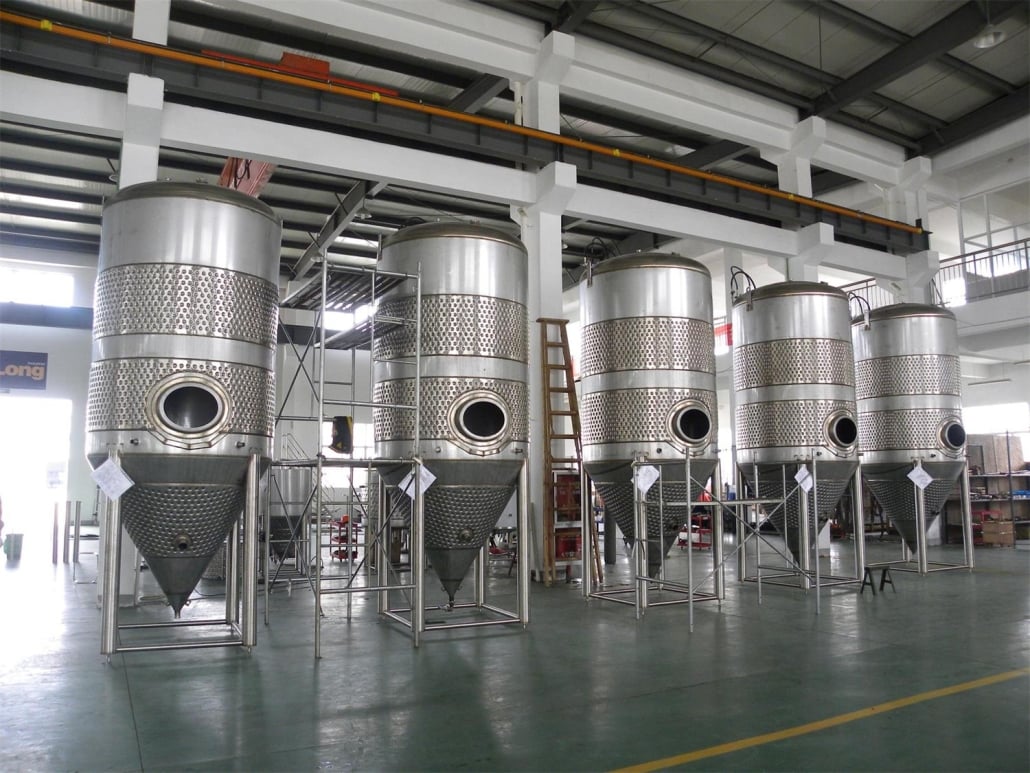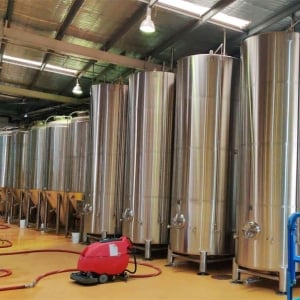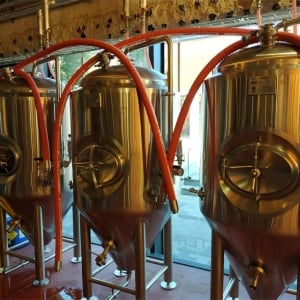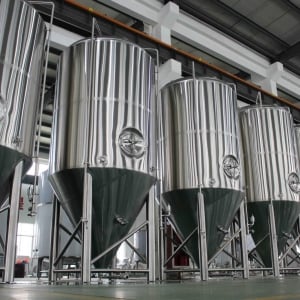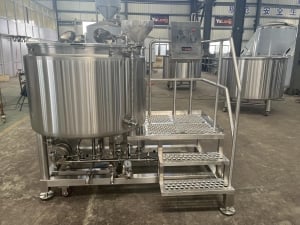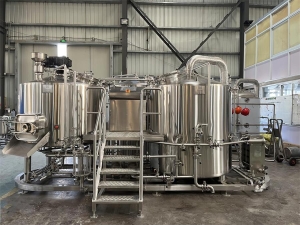Table of Contents
ToggleWhat is a Turnkey Brewery?
A turnkey brewery is a fully-equipped brewing facility that is ready for immediate production upon purchase. This means the buyer doesn’t have to undergo the hassle of setting up each equipment or process from scratch. Instead, everything from the brewing kettles, fermenters, cooling systems, and other essential tools are already installed and operational.
One of the main advantages of a turnkey solution is its ease and quickness of setup. Imagine having the ability to produce your own batch of craft beer almost immediately after the keys to the brewery are handed over. This is particularly beneficial for those who want to penetrate the market quickly or lack the technical know-how of setting up a brewery.
Here are some main components of a turnkey brewery:
- Brewing System: This is where the actual beer-making process begins. A complete system might include mash tuns, brew kettles, and hot liquor tanks.
- Fermentation Tanks: These are essential for the fermentation process where the wort transforms into beer.
- Cooling System: Keeping the beer at the right temperature is crucial for its quality and taste.
- Packaging Line: Once the beer is brewed, it needs to be packaged. This could include canning, bottling, or kegging systems.
It’s also worth noting that while turnkey solutions offer ease, they might come with a higher upfront cost than building a brewery piece by piece. However, the benefits in terms of time saved and potential mistakes avoided can be invaluable for many entrepreneurs.
How Much Does a Turnkey Brewery Cost?
The cost of a turnkey brewery can vary widely based on several factors such as capacity, brand, location, and included features. Here’s a deeper dive into the intricacies of turnkey brewery pricing.
Capacity: The larger the brewery, the higher the cost. A small craft brewery designed for local pubs will be significantly less expensive than a large-scale production brewery.
Brand: Like most industries, there are renowned brands in the brewing world. Premium brands tend to charge higher prices for their equipment due to reputation, quality, and after-sales services.
Location: The cost of shipping and installation can differ based on location. For instance, shipping to a remote area might incur additional costs.
Included Features: Some turnkey breweries come with additional features like advanced automation systems, quality control labs, or a taproom setup, which can increase the overall price.
Here’s a table breaking down the approximate cost ranges based on capacity:
| Capacity (in Barrels) | Price Range |
|---|---|
| 3-5 | $100,000-$250,000 |
| 7-10 | $200,000-$500,000 |
| 15-20 | $400,000-$800,000 |
| 30+ | $750,000 and up |
While this table provides a general overview, it’s always advisable to get quotes from multiple suppliers to get a better understanding of the exact costs involved.
In addition to the initial investment, prospective brewery owners should also consider operational costs such as raw materials (malts, hops, yeast), utilities, licenses, and personnel salaries.
Brands play an essential role in the brewing industry. One of the well-respected brands in the turnkey brewery segment is “BrewTech Solutions”. They are known for their advanced automation systems, high-quality materials, and impeccable after-sales service. However, the brand’s premium quality comes with a corresponding price, often placing them in the upper range of the aforementioned price brackets.
Lastly, while initial costs are a significant factor in the decision-making process, potential buyers should also focus on the long-term benefits. A high-quality turnkey brewery might require a larger upfront investment, but it can lead to fewer breakdowns, better beer quality, and potentially higher profits in the long run.
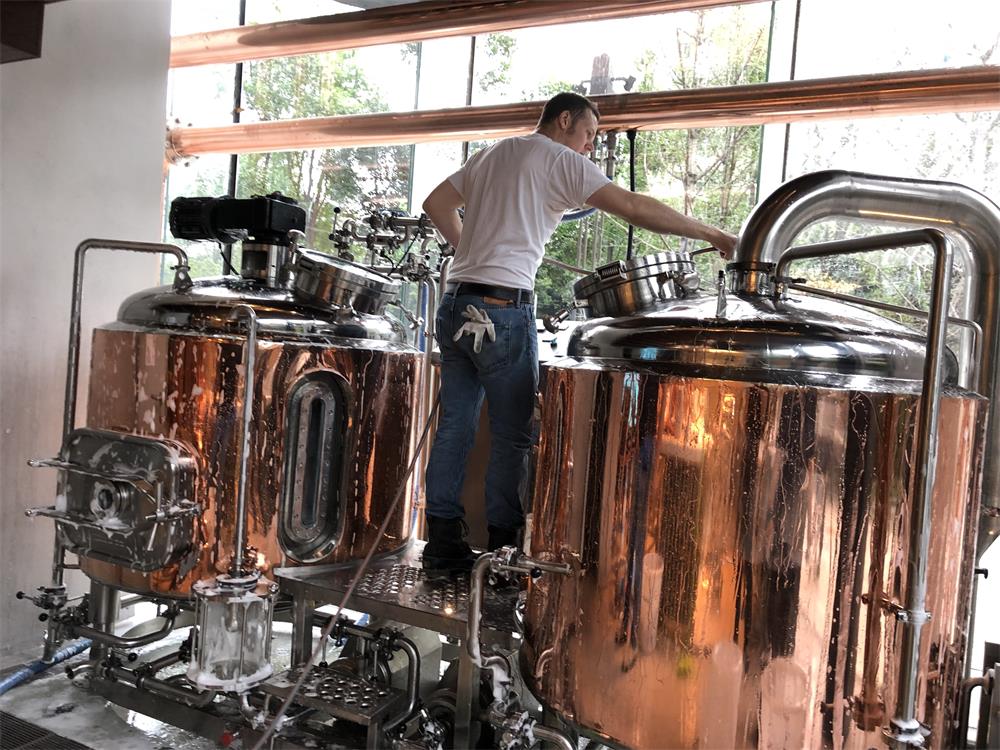
What Are the Types of Turnkey Breweries?
The turnkey brewing industry offers various solutions to cater to the diverse needs of prospective brewers, from small craft brewers to large-scale commercial enterprises. Understanding the different types can help in making informed decisions based on capacity, budget, and the intended scale of operations.
- Nano Breweries: These are the smallest commercial breweries with a capacity typically less than 3 barrels. Ideal for enthusiasts turning their hobby into a business or small pubs wanting to produce their own signature brews.
- Microbreweries: A microbrewery has a capacity ranging from 3 barrels to 15 barrels. They’re best suited for local distribution, with some even having their own taprooms.
- Craft Breweries: These have a slightly larger scale than microbreweries, with a capacity ranging from 15 to 60 barrels. They are often focused on unique, artisanal beers and have a wider distribution network.
- Industrial Breweries: These are the giants of the brewing world with a capacity of over 60 barrels. They cater to a wide market and have extensive distribution channels, sometimes even internationally.
Here’s a table summarizing the types and their approximate cost ranges:
| Brewery Type | Capacity (in Barrels) | Price Range |
|---|---|---|
| Nano Brewery | Less than 3 | $20,000-$80,000 |
| Microbrewery | 3-15 | $100,000-$350,000 |
| Craft Brewery | 15-60 | $350,000-$1,000,000 |
| Industrial Brewery | 60+ | $1,000,000 and up |
Prospective brewers should consider their long-term vision, budget constraints, and target market before deciding on a specific brewery type.
Functions of a Turnkey Brewery
A turnkey brewery is not just about boiling water and fermenting grain; it’s a symphony of meticulously choreographed processes that transform basic ingredients into the beverage loved worldwide. Let’s delve into the primary functions of a turnkey brewery:
- Mashing: This is the first step where milled grains, predominantly malted barley, are mixed with hot water in a mash tun. The heat activates enzymes that convert starches in the grains into fermentable sugars, creating a thick porridge-like mixture known as mash.
- Lautering: After mashing, the liquid is transferred to a vessel called a lauter tun. Here, the spent grains are separated from the liquid, which is now termed wort.
- Boiling: The wort is then boiled, usually for about an hour, in the brew kettle. This is when hops are added, lending bitterness, flavor, and aroma to the beer. Boiling also sterilizes the wort, ensuring no unwanted microorganisms interfere with the fermentation process.
- Cooling: Post boiling, it’s crucial to cool down the wort quickly to a temperature suitable for yeast fermentation. A heat exchanger is commonly used to achieve this rapid cooling.
- Fermentation: The cooled wort is transferred to fermentation tanks, where yeast is added. Yeast consumes the fermentable sugars in the wort, producing alcohol and carbon dioxide in the process.
- Packaging: Once fermentation is complete and the beer has matured, it’s ready to be packaged. Depending on the brewery’s capabilities, this can be in bottles, cans, or kegs.
Each function is vital in its own right, ensuring that the final product is consistent, flavorful, and of high quality.
Applications of a Turnkey Brewery
In the expansive world of beer, the applications of a turnkey brewery are vast and varied. From grassroots local pubs to expansive industrial setups, the spectrum is broad and diverse. Let’s dive deeper into the multifaceted applications of these ready-to-use brewing systems.
1. Local Pubs and Bars: A substantial number of pubs and bars are adopting the trend of serving their own brewed beer. By having a nano or microbrewery setup on the premises, they can offer unique flavors and attract a niche clientele looking for a more personalized beer experience.
2. Craft Beer Taprooms: These are essentially breweries that have their own dedicated serving area. Patrons can savor fresh brews straight from the source, often with the added allure of limited editions or experimental flavors.
3. Restaurants and Hotels: Upscale restaurants and hotels are capitalizing on the craft beer trend by introducing their own labels. It not only adds to the exclusivity but also offers patrons a more comprehensive gastronomic experience.
4. Festivals and Pop-ups: Temporary setups like beer festivals or pop-up events often utilize portable turnkey breweries. These allow brewers to produce and serve fresh beer on-the-go, ensuring optimal quality even outside their regular premises.
5. Commercial Production: Not all turnkey breweries are small. Industrial-sized turnkey solutions cater to large-scale production for mass distribution. These behemoths produce vast quantities of beer that are shipped locally, nationally, or even internationally.
6. Educational Institutions: Some universities and institutes offer brewing science as a course. A micro or nano turnkey brewery serves as a practical laboratory, allowing students to get hands-on experience.
7. Research and Development: Before launching a new flavor or type of beer in the market, breweries often use smaller turnkey setups for research and development. It helps in refining recipes, testing new ingredients, or experimenting with brewing techniques without disrupting the main production line.
8. Collaborative Brewing: It’s not uncommon for brewers to collaborate on special editions or unique brews. A dedicated turnkey brewery can facilitate such collaborative ventures without any interruptions to the regular brewing schedules of the involved parties.
The table below provides a quick summary of turnkey brewery applications and their typical brewery type:
| Application | Typical Brewery Type |
|---|---|
| Local Pubs and Bars | Nano/Microbrewery |
| Craft Beer Taprooms | Micro/Craft Brewery |
| Restaurants and Hotels | Nano/Microbrewery |
| Festivals and Pop-ups | Portable Brewery |
| Commercial Production | Industrial Brewery |
| Educational Institutions | Microbrewery |
| Research and Development | Nano/Microbrewery |
| Collaborative Brewing | Craft Brewery |
Turnkey breweries, with their versatility, cater to diverse applications, ensuring that beer lovers, no matter where they are, get to enjoy the best brews. With the growing popularity of craft beer and a global appreciation for unique flavors, the reach and impact of turnkey breweries are only expected to expand further.
How Does a Turnkey Brewery Benefit You?
The brewing industry has witnessed a remarkable shift with the introduction of turnkey solutions. These ready-to-use systems present an array of advantages for both seasoned brewers and newcomers. Let’s delve into how a turnkey brewery can significantly benefit potential investors and brewers.
- Immediate Start: The name ‘turnkey’ is pretty self-explanatory. The brewery is set to kick off operations almost immediately after installation. This quick start allows businesses to see a return on their investment sooner than if they had started from scratch.
- Cost Predictability: With a turnkey solution, you are purchasing an all-inclusive package. This can often mean better cost predictability as opposed to sourcing different equipment from multiple vendors. There are fewer hidden charges or unforeseen expenses when everything is bundled.
- Consistency in Production: These breweries are pre-tested and calibrated to ensure they deliver the best results. This pre-configuration ensures consistency in beer production, which is vital for brand reputation and customer loyalty.
- Reduced Technical Challenges: Starting a brewery can pose several technical challenges, especially for newcomers. A turnkey system alleviates these pains, as most of the intricate setups and calibrations are handled by the suppliers. This means fewer technical hiccups along the way.
- Scalability: Many turnkey brewery suppliers offer modular systems. This means that if a brewer wants to increase production, they can easily add modules to their existing setup. It provides the flexibility to grow without overhauling the entire system.
- Training and Support: Most turnkey providers offer comprehensive training on their systems. This not only covers the basics but often delves into advanced brewing techniques, ensuring the team can extract the maximum potential from their new brewery.
- Space Optimization: Turnkey breweries are designed keeping space optimization in mind. Every inch of the facility is utilized efficiently, ensuring that even businesses with limited space can house a functional and productive brewery.
How to Choose a Turnkey Brewery?
Choosing the right turnkey brewery is a critical decision that can greatly influence your brewing journey. With multiple vendors, varying features, and a broad price range, the selection process can seem daunting. Here’s a guide to making an informed choice:
- Determine Your Scale: Before diving into the market, understand the scale at which you wish to operate. Whether it’s a nano, micro, craft, or industrial setup, your choice should align with your business goals and projected growth.
- Budget Considerations: Financial constraints play a significant role. Establish a clear budget early on. However, don’t just look at the initial cost. Consider the operational costs, potential for scalability, and the longevity of the equipment. Sometimes, paying a bit more upfront can result in long-term savings.
- Supplier Reputation: It’s essential to choose a reputable supplier. Look for reviews, customer testimonials, and case studies. A reputable supplier not only guarantees quality equipment but often provides better after-sales support.
- Features and Customizability: Turnkey doesn’t always mean one-size-fits-all. Some suppliers offer customization options. List down essential features you require and see if the vendor can cater to these specifics.
- Training and Support: Post-sale training and support can make or break your brewing experience. Ensure that the supplier offers comprehensive training and has a responsive support team.
- Warranty and Service: Brewing equipment undergoes wear and tear. A robust warranty can save you from unexpected costs. Also, check if the supplier has service centers or technicians nearby to avoid prolonged downtimes.
Given the range of options and features, here’s a comparison table to help you evaluate potential choices:
| Criteria | Supplier A | Supplier B | Supplier C |
|---|---|---|---|
| Scale Offered | Nano & Micro | Micro & Craft | All Types |
| Price Range | $50,000-$300,000 | $100,000-$1,000,000 | $20,000-$2,000,000 |
| Customizability | Limited | Moderate | High |
| Warranty Period | 1 Year | 2 Years | 3 Years |
| Training Provided | Yes | Yes | Yes |
| After-sales Support | Responsive | Moderate | Highly Responsive |
Choosing a turnkey brewery requires a mix of foresight, research, and understanding your own needs. With the right choice, the brewing process becomes smoother, ensuring a consistent and quality product for your consumers.
Top 10 Turnkey Brewery Manufacturers
With the rising popularity of craft beer and the ever-increasing demand for unique brews, turnkey brewery manufacturers have taken center stage in providing innovative solutions for brewers. Here’s a spotlight on the top 10 turnkey brewery manufacturers that have carved a niche for themselves:
- BrewTech Solutions: Known for their advanced automation and high-quality materials, they cater to both small-scale and large-scale breweries.
- BrewMasters International: With a global clientele, this manufacturer offers extensive customization options and is renowned for its impeccable customer service.
- CraftBrew Engineering: As the name suggests, they specialize in setups for craft breweries. Their focus on unique brewing techniques and modern designs makes them a favorite among new-age brewers.
- BarrelHouse Equipment Co.: A popular choice for nano and microbreweries, they offer compact designs without compromising on functionality.
- BeerCraft Systems: Their modular designs ensure that brewers can scale up as their production needs increase. They offer a seamless integration of modules to enhance capacity.
- MegaBrew Industries: Catering mainly to industrial-scale breweries, they offer high-capacity equipment with advanced automation features.
- NanoBrew Innovations: They specialize in setups for nano breweries, ensuring that even the smallest setups do not compromise on the quality and variety of brews.
- EcoBrew Equipment Ltd.: Emphasizing sustainability, their equipment is designed to be energy-efficient and environmentally friendly.
- TraditionBrew Co.: Drawing inspiration from traditional brewing methods, their equipment offers a blend of old-world charm with modern technology.
- GlobeBrew Systems: With a presence in multiple countries, they offer versatile solutions catering to diverse brewing traditions and techniques.
To provide a clearer comparison:
| Manufacturer | Specialization | Price Range | Notable Feature |
|---|---|---|---|
| BrewTech Solutions | All Types | $50,000-$1,500,000 | Advanced Automation |
| BrewMasters Intl. | All Types | $60,000-$1,200,000 | Customization |
| CraftBrew Engineering | Craft Breweries | $80,000-$900,000 | Modern Designs |
| BarrelHouse Eq. Co. | Nano & Microbreweries | $20,000-$300,000 | Compact Designs |
| BeerCraft Systems | All Types | $50,000-$1,300,000 | Modular Design |
| MegaBrew Industries | Industrial Breweries | $500,000-$2,000,000 | High Capacity |
| NanoBrew Innovations | Nano Breweries | $10,000-$80,000 | Small-scale Expertise |
| EcoBrew Equipment Ltd. | All Types | $60,000-$1,000,000 | Eco-friendly |
| TraditionBrew Co. | All Types | $70,000-$1,100,000 | Traditional Methods |
| GlobeBrew Systems | All Types | $40,000-$1,400,000 | Global Presence |
With numerous manufacturers vying for attention in the brewing space, it’s crucial to consider factors like scalability, price, after-sales service, and specialization before making a choice. The right manufacturer can significantly influence the success and growth of a brewery.
Where to Buy a Turnkey Brewery?
The brewing industry’s growth means there are numerous options available for prospective brewers seeking turnkey solutions. Knowing where to buy a turnkey brewery can often be the difference between acquiring top-quality equipment or ending up with sub-par machinery. Let’s explore some of the best places and considerations when making this purchase:
- Direct from Manufacturers: Buying directly from manufacturers often ensures you get the best prices and authentic equipment. Companies like BrewTech Solutions and YoLong Brewtech offer direct sales, ensuring their quality and support directly reaches the end user.
- Specialized Trade Shows: Throughout the year, various brewing trade shows and exhibitions take place. These events provide an opportunity to meet multiple manufacturers, compare offerings, and even witness live demonstrations.
- Online Marketplaces: Websites such as Alibaba and Made-in-China house a plethora of manufacturers and suppliers. While it offers convenience, it’s essential to be diligent and verify the authenticity of suppliers before making a purchase.
- Local Distributors: Many international manufacturers have local distributors in various countries. These distributors are trained and equipped to provide sales and after-sales support. They bridge the gap between local consumers and international manufacturers.
- Brewing Associations & Forums: Joining local brewing associations or online forums can be beneficial. Experienced brewers often share their sources and recommendations based on personal experiences.
- Custom Orders: For those with unique requirements, approaching manufacturers for custom orders can be the ideal route. Companies like YoLong Brewtech pride themselves on their custom-designed projects, ensuring that the specific needs of their customers are met.
Product Advantages of Chinese Turnkey Breweries
China’s emergence as a global manufacturing hub also extends to brewery equipment. Over the years, Chinese turnkey breweries have offered several advantages that have made them a preferred choice for many international brewers. Let’s dive deep into the product advantages of Chinese turnkey breweries:
- Cost-Effective: Chinese manufacturing capabilities, combined with lower labor costs, often result in competitively priced equipment without compromising on quality.
- Advanced Technology: Companies like YoLong Brewtech have consistently pushed the boundaries in brewing technology, offering advanced and automated solutions that cater to both budding and experienced brewers.
- Customization: One of the standout features of Chinese manufacturers is their ability to customize. As depicted by YoLong Brewtech’s dedication to ensuring every custom-designed project is tailored to the customer’s exact specifications, customization is a significant advantage.
- Quality Assurance: With ISO certifications and strict quality control processes, many Chinese manufacturers ensure the products are of high standard. YoLong Brewtech, with its state-of-the-art manufacturing plant in the Ningbo City Economic Development Zone, epitomizes this commitment to quality.
- Wide Product Range: From brewing vessels to fermentation tanks, Chinese manufacturers often have an extensive product range, catering to various brewing needs.
- Global Shipping & Installation: Most top-tier Chinese manufacturers offer global shipping options. Additionally, they often provide installation support to ensure the equipment is set up correctly and efficiently.
- After-Sales Support: Post-purchase support is crucial. Many Chinese turnkey brewery suppliers offer comprehensive training, regular maintenance, and prompt customer service to ensure seamless brewing operations.
- Scalability: As breweries grow, there’s often a need to expand or upgrade equipment. Chinese manufacturers, with their modular designs and extensive product catalogs, can cater to these evolving needs, ensuring breweries can scale without hassles.
Best Chinese Turnkey Brewery Supplier
The Chinese brewing equipment market is teeming with suppliers. However, one that consistently stands out with its reputation, experience, and product range is YoLong Brewtech.
- Experience & Expertise: Founded in 2004, YoLong Brewtech brings over 15 years of experience to the table. This rich history ensures they understand the nuances of the brewing industry and are equipped to provide solutions that meet varied needs.
- Versatile Product Range: YoLong isn’t just about beers. They cater to a wide array of beverages, including cold-brewed coffee, kombucha, infused teas, and wine. Such diversity ensures they have a holistic understanding of the beverage industry.
- Customization at Its Best: The emphasis YoLong places on custom-designed projects speaks volumes about their commitment to customer satisfaction. Their advanced manufacturing plant in Ningbo City can meet almost any specification a customer desires.
- State-of-the-Art Facility: With a 36,000 m2 manufacturing plant, YoLong ensures every product is crafted with precision, adhering to international standards. This facility stands as a testament to their dedication to quality and innovation.
- Global Reputation: While YoLong is based in China, their reputation transcends borders. Their commitment to quality, innovation, and customer service has made them a favorite among brewers worldwide.
Choosing a turnkey brewery supplier is a pivotal decision, and with companies like YoLong Brewtech, brewers can rest assured that they are investing in quality, reliability, and innovation.
FAQ
1. What is a turnkey brewery?
A turnkey brewery is a complete brewing solution that allows brewers to start production immediately upon setup. It includes everything from brewing kettles, fermenters, and bottling lines, all pre-configured and ready for operation.
2. Why should I consider buying from Chinese turnkey brewery suppliers?
Chinese turnkey brewery suppliers, like YoLong Brewtech, offer advanced technology, customization, and competitive pricing, ensuring you get high-quality equipment that’s tailored to your needs without breaking the bank.
3. How do I ensure the authenticity of a Chinese brewery supplier?
Always conduct thorough research, seek recommendations from industry peers, check reviews, and perhaps most importantly, communicate directly with the supplier. If possible, visiting the manufacturing plant can also provide clarity.
4. What kind of beverages can I produce with equipment from YoLong Brewtech?
YoLong Brewtech offers equipment suitable for a range of beverages including beer, cold-brewed coffee, kombucha, infused teas, and wine.
5. Are Chinese brewery equipment customizable to fit my specific requirements?
Yes, many top-tier Chinese manufacturers, including YoLong Brewtech, emphasize custom-designed projects, ensuring that equipment is tailored to meet individual brewery specifications and needs.
6. How do I maintain and clean my turnkey brewery equipment?
Regular cleaning and maintenance are crucial for the longevity and efficiency of brewing equipment. Most manufacturers provide detailed manuals and guidelines. Additionally, after-sales support and training sessions can be beneficial.
7. Can I scale up my brewery operations using Chinese turnkey brewery equipment?
Absolutely. Many Chinese manufacturers offer modular designs, allowing you to expand or upgrade equipment seamlessly as your brewery grows.

